The Quest for the Creed is the new edition of my book Adventures in Orthodoxy. The book contains twenty short chapters on the Apostles’ Creed written in a creative “Chestertonian” style.
Here is a sample chapter on the phrase, “He will come again to judge the living and the dead…”
If there is such a thing as truth then it must be something, like air, which is outside myself and inside myself at the same time. If truth is only inside me, then it can only be understood by my own inner responses: what I think and what I feel–my thoughts and emotions. If what determines my truth is merely my own thoughts and emotions, then truth is fickle because not only do my thoughts and emotions contradict those of other people, they often contradict themselves. So I sometimes think and feel that chastity and temperance and self control are good and other times I am just as convinced that lust and gluttony and drunkenness are better.
Therefore truth must be outside me as well as inside me. In other words, there has to be some greater standard for what is true (and therefore for what is right and wrong) than my own inner thoughts and emotions. I need some external standard to go by. Now, where that standard comes from is what is most interesting. Where does that external standard for what is true, what is beautiful, what is good and right originate? It must originate in a mind that is greater than mine.
If there is such a thing as external truth, then there is also such a thing as choice. I can choose to align my own ‘truth’ with The Truth. Or I can choose not to. This element of choice is at the heart of what we mean by ‘judgment’. Judgment is choice, and when we say that Christ will come to judge the living and the dead you could say he is coming to exercise his choice between who will live forever and who will die forever. How he makes that choice is what is intriguing. I, for one, think his choice is rather simple and surprising: he chooses what we have already chosen. He gives us what we want. His judgment confirms our own choices–and there’s a fearful thought!
I like the movies. I don’t go in for those sophisticated French films where men and women smoke cigarettes in bed and discuss the meaning of life in anguished whispers. Neither am I am fan of serious films with social messages. I like Hollywood pictures with big heroes, big villains and big explosions. I am a sucker for a well-crafted story, a good plot line and a happy ending. Despite the complaints of both the puritans and the purists, popular movies are essentially good. That is to say, they are moral. In almost every movie the bad guy loses and the good guy wins.
The cynic will observe that this is because the marketing men have figured out that the crowds like big villains, big heroes and happy endings. This is probably true, but what interests me is why the crowds like happy endings, and what kind of happy endings they like. It is too simple to dismiss hoi polloi just because they like a “happy ending.” They do not like happy endings per se, because they do not want a happy ending for everyone. They only want the good people to be happy. They want the bad people to be unhappy at the end. So in fact, the ordinary person doesn’t like happy endings, he likes just endings. That’s why ordinary people also enjoy a tragedy, because in a classical tragedy a flawed hero gets what is coming to him, and what is coming is not a happy ending.
People have enjoyed drama with justice at the end ever since the first storyteller sat down beside the campfire. The search for meaning, and therefore for justice, has always been at the heart of storytelling. Through the great myths, ordinary people worked out the rules and guidelines of justice. Through the great stories they told others how to live and what payment to expect for both their pains and their pleasures. Through myths and movies ordinary people are reminded about good and evil and the final reward.
A sense of good and evil is universal to the human race. No matter what culture, tribe, society or club, people understand that there is such a thing as right and wrong. They may disagree about the details, but nobody disputes that there is such a thing as right and wrong. In fact, because they dispute about the details proves that they both agree that there is such a thing as right and wrong. The reason they are arguing is because they both believe not only that there is such a thing as right and wrong, but that it is important enough to quarrel about. So if there was no such a thing as right and wrong there would be no point arguing about what is right and what is wrong.
Linked with this universal human instinct that there is right and wrong is the conviction that good will be rewarded and evil punished. The reason people like their movies, plays, myths and stories to provide justice is because there is so precious little of it in their ordinary lives. All around them they see rich people getting richer and poor people getting poorer. They see that crime does pay, that cheaters do actually win and that goodness doesn’t seem to triumph. They know this isn’t fair. They realise that justice in this life is a rare thing, and so they look to their movies, stories and myths to find a world that is fair. Because we have this unshakeable belief in the concept of right, wrong and justice we demand that justice is done and have a deep unshakeable belief that one day things will be sorted out and complete justice will be delivered.
This might be dismissed as wishful thinking, but what turns that upside down is that while we all insist on justice, when justice arrives it is rarely what we have wished for. In other words, justice is usually not what we expect. To judge properly we must have all the facts. To judge fairly we must judge not only the action, but we must also weigh up all the extenuating circumstances, all the motives, and all the results of the action. As a result, there is only one person who can know all the facts, and that is the person who knows everything. The only person who knows everything is God, therefore the only possible judge also turns out to be the fairest possible judge. Indeed, based on those criteria, God is the only one who can give a totally fair, impartial and unbiased judgement. If this is true, then the Christian idea of a final judgement becomes not only a doctrine, but a desire. If we want justice and a fair hearing, as all sane people do, then the final judgement is not only something to fear, but something to hope for. Furthermore, while we may hope for justice, it is impossible (because we do not have all the facts) to know what form that justice will take. Therefore the only thing we can predict is that the final judgement will be unpredictable.
About fifteen years ago I visited the magnificent Cathedral of Chartres in France. At the time an eccentric Englishman lived in a small apartment in the city, and dedicated his life to giving English speaking tours of the cathedral. I happened to find myself on one of his famous excursions. Toward the end of our tramp around this most awesome temple to the incarnation of the Son of God, we wound up at the great South Door. Over the portal is a carving of the Last Judgement with Christ seated on the judgement throne. Before him stands Saint Michael with his scales of justice. On the right hand side the graves are being opened, and angels are assisting the righteous to rise up to eternal life. On the left grimacing demons are spearing the wicked and pushing them down into the everlasting fires. My overly vivid imagination warmed to this medieval scenario. It may have been devised in the Dark Ages, but it didn’t seem dark to me. On the contrary, the delicately carved scene, set like a jewel in the magnificent cathedral, seemed like a burst of radiant light in our own dark age.
The Englishman began his lecture by saying, “Notice that the judgement has to take place at the end of time, not at the end of our lives. That is because we will be judged not only by our decisions and deeds, but also by the effects of each decision and action, and of course, the effects of all our decisions and actions cannot be tallied until the end of time. The effects of each decision and action ripple outward forever down the centuries.” This little aside struck me quite hard, and it hurt. It is quite disturbing to imagine that, not only will our actions, words and decisions will be judged, but also every effect and consequence of our actions as they reverberate down through the ages.
Then the English aesthete caught my attention a second time. “Do notice,” he said, “how the stone carver seven hundred years ago took the trouble to carve the faces on both sides with an expression of surprise.” Indeed, when I looked closely, I saw he was right. Both the damned and the saved registered surprise at the outcome. This in itself, is a surprising but sensible observation. Those who are destined for heaven are humble and therefore they will be surprised because they do not think they deserve heaven. At the same time, those who are damned, being proud, are sure they do not deserve hell. I was delighted further to see that among the damned were a couple of bishops and monks while among the saved were women and men who, by their dress, had clearly lived for pleasure.
Such subversion of the social order is totally consistent with the gospel stories. The one who turned over the tables in the temple turned over everyone’s expectations. At the final judgement he will turn them over again. That the final judgement will be a surprise is one of those subversive details to which everyone ought to pay attention. If we believe there is meaning to life, then we must believe in justice, and if true justice considers and weighs up all the facts, then it must happen, as my English friend observed, at the end of time. Since this is so, there is naturally an awful lot of room for surprise. Who knows what evil may flow from that one bad, selfish and nasty decision of mine, which at the time seemed insignificant? What everlasting glory, on the other hand, might grow from one small act of kindness? At the same time, who can guess how a seemingly bad decision might be turned, by our shame, for the good; while a seemingly good action might be distorted into terrible evil by pride, self glory or the wrong motive?
Time will tell. So, for example, consider the nameless stone carver at Chartres seven hundred years ago. Carving those faces was perhaps just another day’s work. He did his best and was intelligent enough to understand why the faces should show surprise. He probably died as he lived—as a poor, unknown craftsman. Then one day hundreds of years later, an eccentric Englishman notices the detail and passes it on to countless pilgrims. I heard the story and have told many people, and now you are reading it in this book. Perhaps you will be inspired, and one day go out to change the world with a life on fire with goodness and love. And that humble stone carver in France so long ago will get some of the credit.
This is the surprising nature of providence, and why studying the way of God’s will in the world is far more interesting than the most intricately woven plot of any drama, movie or novel. The tiniest seeds may grow into the greatest of trees, and that is part of what Christ meant when he preached about mustard seeds. The tiniest action may bring about the greatest result. Who would have imagined, for instance, that the political execution of a small town street preacher in a backwater of the Roman Empire would redeem the world? This everlasting plot twist is one of the most fascinating and absorbing aspects of the last judgement. What a compelling idea, to imagine that every thought, word and deed will one day be counted and given its just and proper reward! Yet this certainty remains within the human heart. We know that the play will have a final act. Summer will draw to a close, the days will get shorter, the nights colder and harvest will come.
There are those who deny this truth, but if anything is true, then the inescapable fact of judgement must also be true. What I mean, is that for there to be such a thing as truth at all, then there must logically be such a thing as judgement, because judgement is simply the final proclamation and clear resolution of truth. As Saint Paul put it. “Now we see as through a glass darkly. Then we shall see him face to face.” In other words, the time must come when all falsehood fades away, all dissimulation, phoniness and presumption are revealed to be a cheap charade. Then the truth shall be told. All shall be revealed. What is secret shall be shouted from the housetops. This must happen simply because it is the very nature of truth to be proclaimed. Truth is something that has an inner, inexorable drive to be revealed. It cannot be concealed forever. Like Dostoevsky’s murderer in Crime and Punishment the grisly story cannot be suppressed. Truth will out.
If truth, like light, cannot finally be hid, then lies, on the other hand, have a built in instability. They have a natural inclination to disintegrate, topple and fall. As a result there must come a time, if not in this life, then in the next, when all the paper pride, tinselly show and shallow trickery of deceit and self-deceit must be stripped away. Judgement Day is that time. For the medieval stone carver this included Christ on his judgement seat, weighing up the good and evil we have done or not done, and this image is as good as any. After all, Jesus Christ claimed to be the Truth as well as the Way and the Life. Seeing him as he really is will be the very essence of judgement. In fact, why do we need anything else? To see him will be to reveal our whole lives for what they really were. In his light we shall see light. In his light we shall also see the darkness, perhaps for the first time, and for most people a true vision of both the horror of the dark and the glory of the light will be judgement itself.
At that point all the choices we have made will be summarised by one choice. At that point every knee shall bow and every tongue confess that Jesus Christ is Lord. After their initial surprise, some will confess his Lordship through gritted teeth, bowing the knee with terror and hatred in their hearts until the very end. To see him will be to see everything they have always hated and despised. To see him will be to acknowledge that they were wrong, very wrong about everything, and at that point, even the good they have done will be soured by their rebellion and become for them the desperate actions and decisions of the damned.
For others the surprise will be just as great, but in seeing him they will see the Beauty they have always loved, the Truth they have always sought and the Love they always knew existed. For those who, even unknowingly, have followed the light will be taken into the light. At that point all their decisions and deeds will be redeemed. The redeemed will be surprised because for them nothing was wasted. Everything was gathered up, and even the sordid deeds and decisions will have been turned around. Their decisions and deeds, which were spotted with shadow, will be revealed as dappled glories. Their wrong turnings will prove to have been the scenic route, their failures will be revealed as learning points, and their battle scars will be their red badges of courage.
Because the judgement cannot come until the end of time, and because it will be full of surprises we are told not to judge anything in this life. How can we ever analyse the mass of hidden motives? How can we negotiate the labyrinth of our hidden desires, our unconscious instincts and the circumstances of our crimes? To embark upon that route is to be stuck down by the paralysis of analysis. That path is endless, dark and eternally confusing. It is right not to judge lest we be judged, and the sting in the tail of that saying is that if we do judge, then we shall be judged by the worst and most unfair judge of all: ourselves.
Better to throw ourselves on the mercy. Better to trust the judge who knows all, since to know all is to forgive all. In the meantime, if we take such a view, we can live in freedom. As the greatest modern saint teaches us, we can simply trust in God like little children. We can live each day to the best of our ability and take no thought for tomorrow. We can look to the flowers of the field and the birds of the air and learn from them how to live. They do not toil, they do not spin. They do not judge. If we can only cultivate that kind of simple trust, then when the end comes we might just awake from our sleep with a gasp of surprise and find ourselves being lifted up to a burning justice that has already been completed by mercy.
Go here to purchase Quest for the Creed

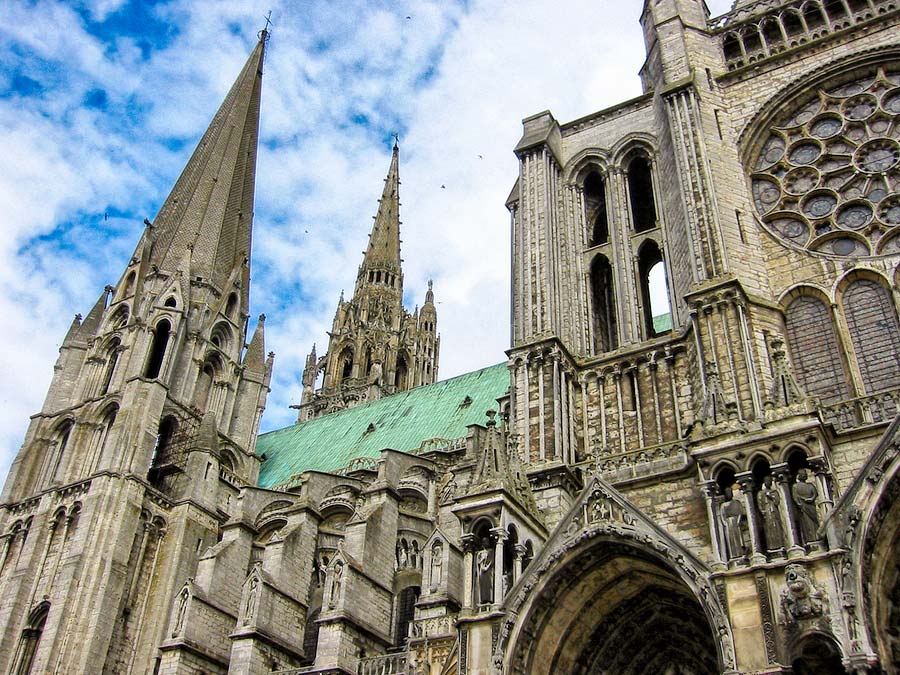
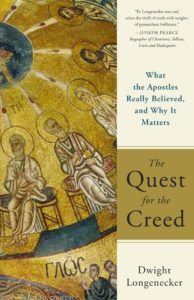
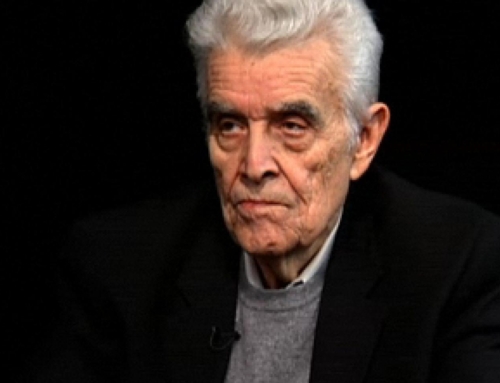
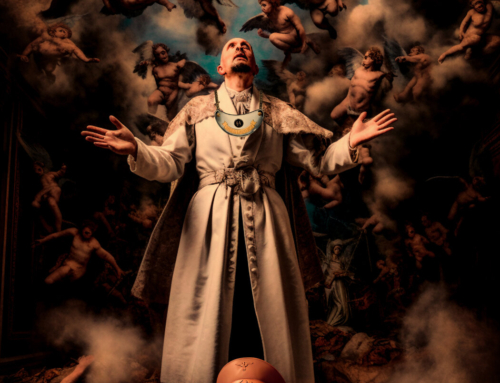
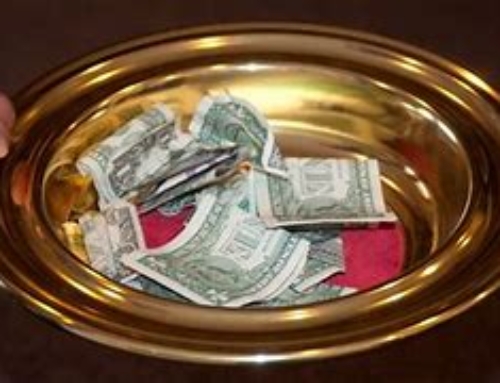


Leave A Comment
You must be logged in to post a comment.